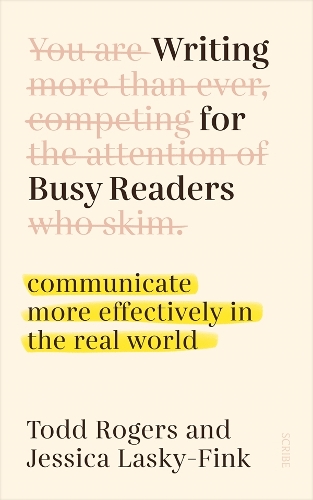
Writing for Busy Readers: communicate more effectively in the real world
(Paperback)
Publishing Details
Writing for Busy Readers: communicate more effectively in the real world
By (Author) Todd Rogers
By (author) Jessica Lasky-Fink
Scribe Publications
Scribe Publications
5th September 2023
Australia
Classifications
General
Non Fiction
Writing and editing guides
Business communication, etiquette and presentation
Communication studies
Physical Properties
Paperback
240
Width 153mm, Height 233mm, Spine 20mm
319g
Description
We were all taught the fundamentals of writing well in school. But how do we write effectively in today's hyper-interactive world When The Elements of Style and On Writing Well were published in 1959 and 1976, the internet hadn't been invented. Since then, there has been a radical transformation in how we communicate. The average adult receives over 100 emails and tens of text messages each day. With all this correspondence, gaining a busy reader's attention is now a competition. Todd Rogers and Jessica Lasky-Fink, both behavioural scientists, offer practical writing advice you can use today. They begin by outlining cognitive facts about how busy people read, then detail six research-backed principles for effective writing- Use fewer words Lower the reading level Use formatting judiciously Make the purpose clear for skimmers Emphasise value for readers Make responding as easy as possible Including many examples, a checklist, and other tools for the most effective writing, this handbook will make you a more effective communicator. Rogers and Lasky-Fink bring conventional ideas about text-based communication into the 21st century's radically transformed attention marketplace.
Author Bio
Todd Rogers (Author) Todd Rogers is a professor of public policy at Harvard University, where he has won teaching awards for the past six consecutive years. A behavioural scientist and the co-founder of the Analyst Institute and Everyday Labs, his opinion pieces have appeared in the New York Times, the Los Angeles Times, and Politico, among others. Jessica Lasky-Fink (Author) Jessica Lasky-Fink is a PhD candidate at the University of California, Berkeley, a senior analyst at EveryDay Labs, and an associate fellow with the Office of Evaluation Sciences. Her research focuses on improving the delivery of social services by connecting low-income populations to government programs.
